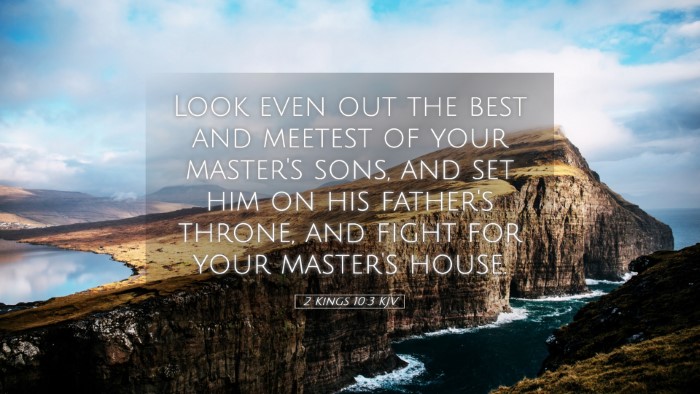Commentary on 2 Kings 10:3
The verse 2 Kings 10:3 provides a pivotal moment in the narrative of the history of Israel, especially regarding the fate of the house of Ahab and the zealous actions of Jehu. The interpretation of this verse has been diligently examined by various scholars and commentators throughout history.
Contextual Background
In order to fully appreciate the implications of 2 Kings 10:3, it is important to consider its historical and theological context. This section of Scripture details Jehu’s ascension to power, his military campaigns, and the divine mandate that directed his actions against the house of Ahab. Essentially, Jehu is being commissioned to purge Israel of idol worship and the descendants of Ahab, who had led the nation away from Yahweh.
Verse Analysis
The specific instruction given in 2 Kings 10:3 serves as a call to action for those who are loyal to Jehu. The verse states:
"Choose the best and fittest of your master's sons, and set him on his father's throne; and fight for your master's house."
This command highlights several key elements:
- Selection of Leadership: Jehu calls for the selection of the best among Ahab's sons, which implies the need for strength and capability in leadership. This reflects a theme prevalent in the Old Testament where God selects leaders according to their character and capability.
- Divine Providence: The idea of fighting for one’s master’s house highlights the importance of loyalty and the belief in God’s providence in Israel’s history. Jehu, as anointed of God, embodies the divine authority to bring judgment upon Ahab’s lineage.
- Conflict and Resolution: The call to “fight” signifies the vigorous action required in the face of idolatry and corruption. Jehu's mission is not merely political; it is a spiritual warfare aimed at restoring proper worship in Israel.
Theological Implications
The instructions of Jehu in this verse bear significant theological weight. The passage is not just a historical account but serves as a profound commentary on God's sovereignty and justice.
- God’s Sovereignty: The removal of Ahab’s dynasty is a decisive act illustrating that God holds ultimate authority over the nations and their rulers.
- Judgment: This verse showcases the theme of divine judgment against those who lead God’s people away from Him. Jehu's role embodies a righteous vengeance led by God’s command.
- Call to Faithfulness: For pastors and spiritual leaders, this verse serves as a reminder of the importance of faithfulness to God, and the necessity of fighting against any influences that detract from true worship.
Insights from Commentators
Various commentaries provide additional insights into this significant passage.
Matthew Henry
Matthew Henry notes that Jehu speaks with authority as he takes charge of a divine mission. He emphasizes that God often uses human instruments to fulfill His purposes, whether by anointing or calling forth judgment, making it clear that this battle is not merely political but one that reflects the spiritual state of the nation.
Albert Barnes
In his commentary, Albert Barnes observes that the instruction to “fight for your master's house” implies a necessity for courage and decisiveness in upholding divine objectives. He further explains that this battle includes both physical and spiritual elements, indicating a war against idolatry that plagued Israel under Ahab’s influence.
Adam Clarke
Adam Clarke provides a linguistic analysis of the term "fight," positing that it carries a sense of not only physical engagement but also moral and ethical determination. He reflects on the nature of the leadership selected and how that reflects God's design for righteous governance, situating Jehu's actions within the larger framework of divine justice.
Practical Applications
The strong exhortations found in 2 Kings 10:3 have practical implications for contemporary readers and leaders in the faith:
- Courage in Leadership: Pastors and church leaders are reminded to choose capable individuals who uphold biblical principles and to act decisively against spiritual corruption.
- Restoration of True Worship: This verse serves as a call for congregational and individual dedication to fighting against modern forms of idolatry.
- Divine Commission: Recognizing that leaders are called to be instruments of God's will affirms the importance of adhering to scriptural commands in both public and private life.
Conclusion
2 Kings 10:3 offers profound insights into the duty of leaders and the necessity of battling against corruption while reaffirming God’s ultimate authority over His people. Through this commentary, we are reminded of the timeless principles of faithfulness, courage, and the importance of divine purpose in our actions.


